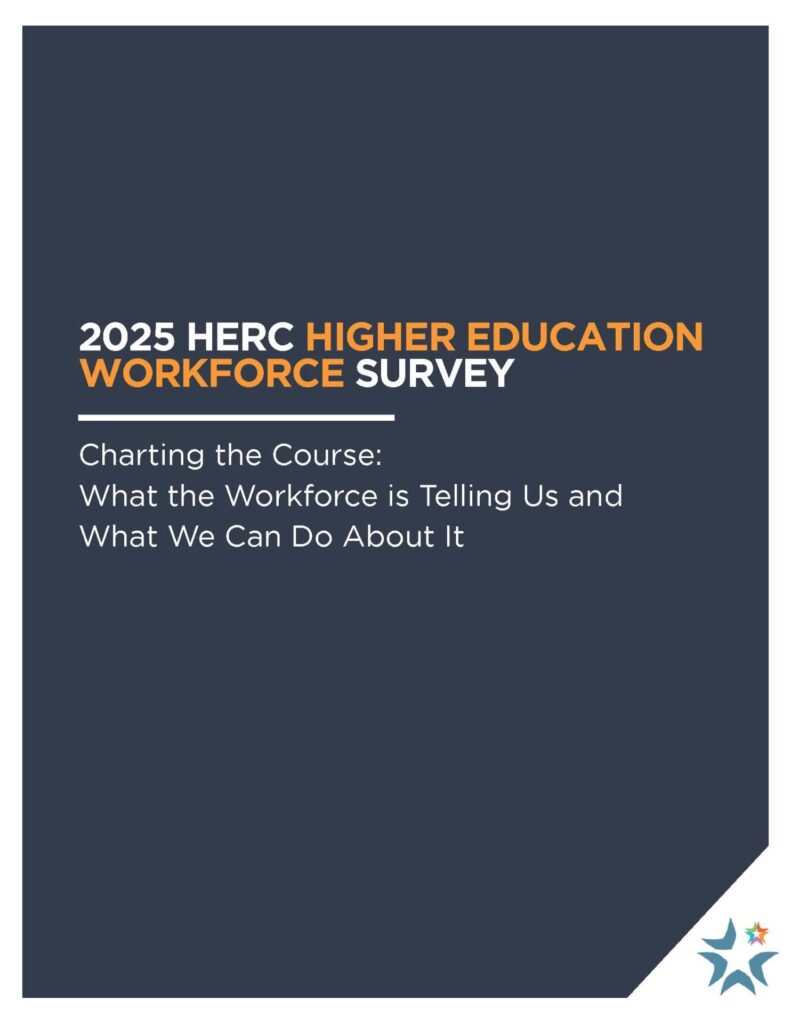
San Francisco, CA — The Higher Education Recruitment Consortium (HERC) has released the findings of its 2025 HERC Higher Education Workforce Survey, providing a data-driven snapshot of the needs, concerns, and motivations of current and prospective employees in higher education. Conducted from February 4 to March 2, 2025, the survey gathered input from 1,322 respondents, providing higher education institutions with valuable insights on attracting and retaining talent in a highly competitive market. [The full report, Charting the Course: What the Workforce is Telling Us and What We Can Do About It, is available to HERC members. If you are interested in accessing the report, please contact Marcia Silva – see info at the bottom.]
The findings support what many in higher education have long suspected: that culture, flexibility, and a sense of belonging are just as important as salary, if not more so. Organizations that invest in these key areas tend to keep their employees longer and are more competitive when attracting talent.
“Our members are already doing the hard work, but sustaining progress takes more than commitment. It takes practical tools, trusted insights, and shared solutions,” said Jessica Wise, Co-Executive Director and Director of Programs of HERC. “That’s why we produced this report, to help institutions move from data to direction, and from insight to impact. Real change is possible when we focus on what’s doable and do it together.”
The annual survey, formerly known as the HERC Job Seeker Survey, was expanded this year to provide a more nuanced understanding of workplace experiences. It included new and refined questions on employee connection, community, flexibility, and well-being, creating a more holistic picture of what today’s higher ed workforce expects from their employers.
Higher Ed in a Broader Talent Market
One of the most revealing data points from the 2025 survey is how candidates are approaching their job search:
- 51% of respondents are exploring opportunities across multiple industries, including higher education.
- 39% are actively seeking careers specifically within higher education.
- Only 10% are looking exclusively outside higher education.
These numbers highlight both the challenge and the opportunity for colleges and universities. While higher ed institutions must compete in a broader talent pool, the data makes clear that many candidates haven’t abandoned their interest in higher ed careers. Institutions that communicate their workplace culture, growth opportunities, and mission-driven impact have a strong chance of attracting talent from this highly flexible pool.
Key Findings: What Today’s Workforce Wants
Beyond job search trends, the 2025 HERC Workforce Survey also sheds light on what’s driving job satisfaction:
- Salary and compensation remain top of mind, cited by 51% of respondents as their primary concern.
- Nearly half of respondents (46%) report experiencing career stagnation, with limited growth opportunities.
- Burnout and stress are significant issues, affecting 32% of respondents.
These challenges underscore the need for institutions to make targeted, structural improvements that go beyond compensation. Investments in career development, workload management, and career advancement pathways could yield significant gains in employee engagement and retention.
The Power of Community and Flexibility
The data also highlights the profound role that workplace community plays in employee satisfaction:
- 90% of respondents say having a sense of community at work is important, with 61% strongly agreeing and another 29% somewhat agreeing.
- Over 80% believe workplace community directly impacts their job satisfaction.
When it comes to how people work, hybrid work models emerged as the clear favorite:
- Hybrid workers reported the highest satisfaction rates (64%) while maintaining strong connection scores (52%), nearly on par with fully in-person workers.
- This pattern held across key indicators such as workplace relationships and a sense of belonging, indicating that limited on-site engagement can preserve community benefits while still offering valued flexibility.
Looking Ahead: From Insight to Action
HERC will use the results of this year’s survey to inform new programming, resource development, and learning opportunities for its member institutions. Member institutions will also receive suggested strategies to enhance their recruitment and retention efforts.
ABOUT THE HIGHER EDUCATION RECRUITMENT CONSORTIUM: The Higher Education Recruitment Consortium (HERC) is a nonprofit consortium committed to improving higher education recruitment practices and workplace culture to strengthen our institutions and serve our communities With over 550 colleges, universities, hospitals, research labs, government agencies, and related organizations, HERC works to ensure member institutions are sites of belonging, where all faculty and staff can thrive. HERC provides resources, networking, and outreach programs to attract, hire, and retain a qualified, multi-faceted workforce. HERC also helps job seekers find, apply for, and succeed in higher education careers through its website, HERC Jobs.
CONTACT: Marcia Silva, Higher Education Recruitment Consortium, marcia@hercjobs.org, 650-417-3193









